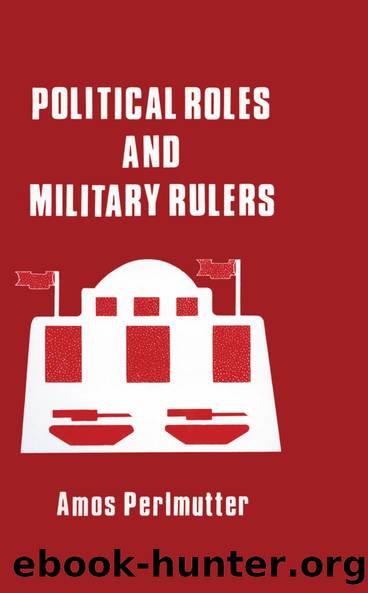Political Roles and Military Rulers by Amos Perlmutter

Author:Amos Perlmutter [Perlmutter, Amos]
Language: eng
Format: epub
Tags: History, Military, General, Political Science, Security (National & International)
ISBN: 9781135168490
Google: 4SppAwAAQBAJ
Publisher: Routledge
Published: 2014-04-23T16:03:09+00:00
PROSPECTS OF THE ARMY
In almost three turbulent decades, the Syrian army has emerged from the role of a military force to become the political guardian of the country. The continuous civilian interference in army politics, and the politicization and radicalization of the army, has increased the influence of military politicians. The army no longer acts as an arbitrator of nationalist and progressive forces. It has been persuaded of its unique historical destiny and special political role as the âsaviorâ of society from the âcorruptâ politician. It has assumed the role of âheroâ and considers itself the key and the only hope for honest politics, stability, order, and progress. These expectations and aspirations, now claimed exclusively by the army, have been supported in the last three decades by the civilian politicians, by the progressive forces, by the intellectuals, and the modernizers. Because most of these groups have discredited themselves by one means or another, the Syrian army has remained the only political organization above the battle. But, interestingly enough, the army has not been consolidated since its political emergence. Nor did the officer corps become cohesive under the intense process of politicization. The politicization of the army encouraged independent army officers and cliques to espouse a variety of rival political ideologies which only divided the officer corps. If civilian political groups had acted as the army now does, they would have been discredited. Yet the army still increases its influence, and now actually dominates Syrian society despite its apparent fratricidal tendencies, the machinations of ambitious officers, and the espousal of rival political ideologies by different army officers. It still retains the image of a new modernizing elite; of the honest rescuers of society; of the heroes and knights (Fursan) of Arabhood and of Syria.
The emergence of the office of the Presidency after the 1970 coup was another constraint on the party. Asadâs popularity after the 1973 October war and the revised Syrian constitution of 1973 augmented the power of the Presidency, i.e. Asad. Asadâs ascendency coincided with executive power that stems both from Asadâs personality and Syrian social forces.39 Asadâs centrality however should not overlook the role of Baâth. Certainly not the role of the military.
For Syria, a reasonably long reign of constitutional life seems unlikely, if not impossible. The Asad reign since 1970 seems quiescent, at least on the surface. The Asad dictatorship is not challenged by Baâth. But it certainly curtails Asadâs moves, as was the case in November 1977 when the Syrian Baâth adamantly opposed Sadatâs peace mission to Israel. Apparently, the rivalry between the Syrian and Iraqi Baâth factions has not subsided and the war in Lebanon or a war with Israel seems to keep the army-party hyphen still buckled. The chances are that, whatever the outcome, army groups eventually expect independent and army-dominated rule, and they may establish their own political organization as Shishakly, Nasser and Asad did. Asad, serving as a link between the Party and the military, enhanced his role at the expense of the military, which was not the case before 1970.
Download
This site does not store any files on its server. We only index and link to content provided by other sites. Please contact the content providers to delete copyright contents if any and email us, we'll remove relevant links or contents immediately.
The European Opportunity by Felipe Fernández-Armesto(568)
The European History Highway: A Guide to Internet Resources by Dennis A. Trinkle Scott A. Merriman(534)
Morgan Kaufmann Digital Watermarking and Steganography by Ingemar Cox Matthew Miller Jeffrey Bloom Jessica Fridrich Ton(528)
The Seven Wonders of the Ancient World by Michael Denis Higgins(518)
Hyperculture by Byung-Chul Han(503)
European Security in a Global Context by Thierry Tardy(501)
European Security without the Soviet Union by Stuart Croft Phil Williams(501)
The Routledge companion to Christian ethics by D. Stephen Long Rebekah L. Miles(496)
Get Real with Storytime by Julie Dietzel-Glair & Marianne Crandall Follis(443)
Hudud Al-'Alam 'The Regions of the World' - a Persian Geography 372 A.H. (982 AD) by V. V. Minorsky & C. E. Bosworth(436)
Gorbachev And His Generals by William C. Green(427)
Tibetan Studies in Comparative Perspective by Chih-yu Shih Yu-Wen Chen(426)
Governance, Growth and Global Leadership by Espen Moe(417)
How Languages Are Learned 5th Edition by Patsy M Lightbown;Nina Spada; & Nina Spada(406)
CliffsNotes on Fitzgerald's The Great Gatsby by Kate Maurer(398)
The Oxford History of the World by Fernández-Armesto Felipe;(388)
The Egyptian Economy, 1952-2000 by Khalid Ikram(376)
Oral Poetry and Narratives from Central Arabia: The Poetry of Ad-Dindan : A Bedouin Bard in Southern Najd (Studies in Arabic Literature, Vol 17) (English and Arabic Edition) by P. M. Kupershoek P. Marcel Kurpershoek(365)
The Oxford Handbook of the Incas by Sonia Alconini(364)
